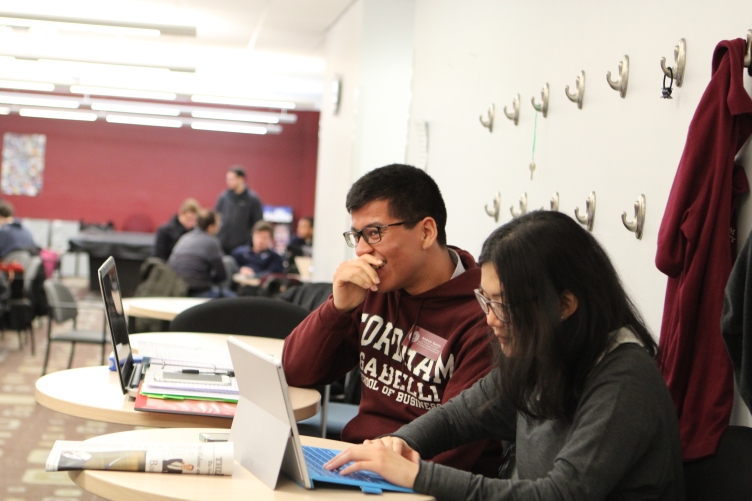
CSA works to integrate commuter students into campus life. Not all respond the same, however, according to some students. Kellyn Simpkins/The Fordham Ram
By Ashley Katusa
Sunya Mouada, FCRH ’18, wakes up before sunrise on most days. By 6:20 a.m., she is hurrying out of the house to begin her hour-and-a-half journey from New Jersey to the Bronx.
Meanwhile in the Bronx, Michael Cibelli, FCRH ’16, lives merely 10 minutes away from campus, and sleeps in until 9:30 most mornings.
However, these individuals both have something in common: they are both part of Fordham’s commuter community which consists of the 20 percent of the total student body who declined housing or were not offered it.
Making new friends in a new environment can be downright terrifying, but the Commuter Student Association (CSA) helps many commuters feel involved. Groups of 15-20 students are assigned a “commuter assistant.” These commuter assistants work tirelessly to ensure that their commuters feel at home.
Christian Eble, FCRH ’18, said, “Mine was pretty much there to assist us with anything we need and help us get acclimated to the commuter lifestyle.”
Paul Spano, FCRH ’15, is a senior commuter assistant. He is a commuter himself who lives in the Bronx. Both of his parents attended Fordham and took him to visit the campus where they first met. Ever since then, he fell in love. Spano commutes because of how close his family lives to the campus.
Although Spano thinks that Fordham does a wonderful job in bridging the gap between residents and commuters, he believes there is still some room for improvement. Most extracurricular activities are held late at night.
While this may not pose as an issue for commuters who live close, such as Spano, it proves to be an issue for those who have to commute from the far reaches of the tri-state area. If Mouada, who lives an hour and a half away in New Jersey, wanted to stay for a 9 p.m. club meeting, she would have to anticipate getting home at midnight, or even later. Spano, who lives minutes away, also cited this issue.
“I would often find myself coming home at midnight or 1 a.m. from events that run late,” he said. “Although late programs may not be a problem for some, this is a serious issue for many who travel extreme distances who are missing out on the opportunity to bond with other students, foster new friendships and spread their horizons — an aspect that is highlighted in the Jesuit mission.”
Spano also believes that some commuter students are at a academic disadvantage. He has encountered many commuters who are interested in integrated learning communities (ILCs) to expand their study time and knowledge of certain topics. Unfortunately, many of these programs run in the residence halls at relatively late times in the evening.
To remedy these problems, Spano suggests simple changes to help further integrate the resident and commuter communities, stating that, “by planning events and club meetings at earlier times (what we often call ‘commuter friendly times’ in CSS), more students from varying backgrounds, living conditions, etc., will be able to attend. This raises the level of diversity of students who are involved on campus along with the opportunity to share various ideas and perspectives that may otherwise go unheard. Additionally, by either holding integrated learning community meetings and programs earlier in the day or making one specifically designed with ‘commuter friendly times’ in mind, this will offer equal academic opportunities and assistance for all students.”
The Commuter Student Association makes many commuters feel like they have a “family” of their own within the commuter community. According to many students, it is an incredibly inclusive environment. In contrast, Mouada stated, “I feel like here, it is not so much as quantity of friends; I’ve made quite a few quality friends.”
While some students are happy being relatively uninvolved, many others want to meet new people and explore new things.
“In my opinion, bridging the gap between residential and commuter students boils down to the students on an individual level and how involved they wish to be while at Fordham,” Spano said.
He believes that residents and commuters must actively work together to assimilate into a cohesive group, and gives the following advice to organizations around campus: “I ask club leaders, administrator and organizers to please consider this point for the only way to attain this goal of linking Fordham’s students together is through mutual action and dedication to one another.”
